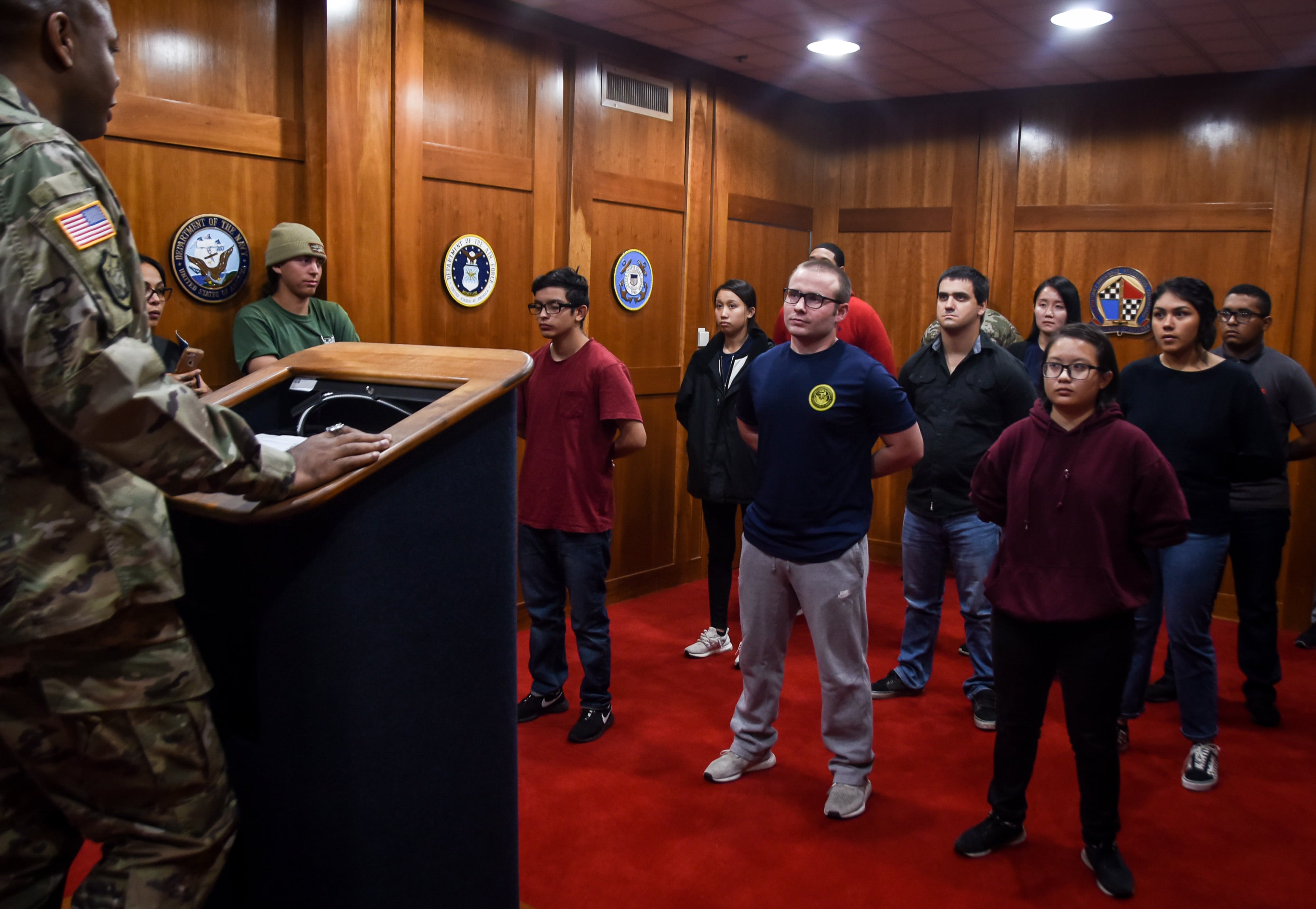While most moves, travel and deployments have come to a screeching halt throughout the military, the services are continuing to ship recruits off to basic training, provided they pass initial screening for coronavirus.
But during a time when millions of Americans are being urged to stay home, or at least keep a 6-foot distance from others, recruits are still sitting shoulder-to-shoulder at Military Entry Processing Stations as they complete their intake procedures before heading to initial entry training.
The flow of recruits has not ebbed as the coronavirus pandemic has spread, according to a MEPS station staffer who reached out to Military Times on Thursday. The recruits are transported on crammed buses and shepherded into small meeting rooms of 40 to 50 people at a time ― more at larger stations like Los Angeles and New York City ― with just inches between them.
“They have made the decision ― I don’t know how high ― that we will continue with the accessions mission,” the staff member said of the defense secretary’s office, which directly oversees Military Entrance Processing Command.
In response to the concerns raised, the Defense Department told Military Times that commanders “should be doing everything in their power” to follow current Centers for Disease Control and Prevention guidelines.
“The services continue to bring new recruits in, but the needs of immediate throughput must be balanced with force health protection measures,” the statement reads.
But on the ground, that has been easier said that done, the MEPS staffer said.
“The general guidance is do the best you can, but...it’s not even really MEPS’ fault,” he said. “The recruiting commands are the ones who determine the throughput. They bring the applicants. And the facilities are what they are.”
There has not been an opportunity to stagger intake or stretch out timelines for moving recruits through MEPS and off to their training bases, he added.
Staffers are screening each recruit for fevers and other symptoms of infection, as well as trying to determine their potential contact with infected friends or family, much the way basic training centers have started doing over the past few weeks.
“The obvious problem is, this pandemic is driven by people who are asymptomatic," the staffer said.
And while his station is stocked up on hand sanitizer, there’s nowhere to buy the amount of disinfectant required to sanitize surfaces every two hours, per the guidance from MEPCOM.
“The leadership is scrambling to try to figure out how to do this safely, but there is no safe way to do it," he said. “All the risk has been offloaded, essentially, onto the employees who are stuffed in these rooms with 40 applicants at a time.”
The Army announced Friday that its entire recruiting force would go remote, limiting in-person contact with recruits. That includes halting all visits to MEPS stations except to specifically deliver recruits who are shipping to basic, Army Recruiting Command spokeswoman Lisa Ferguson told Military Times.
“The Navy has instituted a 14-day restriction of movement for all incoming recruits, where they practice social distancing,” according to the DoD statement. “They begin the process of becoming sailors while in this isolated group. Following the 14-day period, they move on to the full training program.”
Earlier this week, the Washington Post reported that Defense Secretary Mark Esper had decided to keep basic training running as normal, which has the potential to bring in thousands of asymptomatic recruits a month as the pandemic continues.
“The secretary met with the service secretaries and service chiefs today to talk about training," Hoffman said in a Monday statement provided to Military Times. "A decision was made to continue with training missions while taking precautionary measures to limit any possible spread. This will be continuously evaluated to ensure mission-critical requirements are met and our people are kept safe.”
Meghann Myers is the Pentagon bureau chief at Military Times. She covers operations, policy, personnel, leadership and other issues affecting service members.





